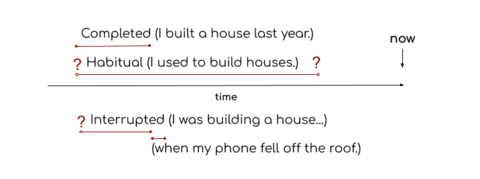The two most common tenses to talk about the past in French are the imparfait (“imperfect”) and passé composé (literally “composite past,” but more generally the “past perfect” tense). The imperfect tense is generally used for descriptions of past events or actions without a specific endpoint in time.
J’aimais [imperfect] les parfaits, maintenant je préfère le yaourt nature. I used to enjoy parfaits; now I prefer just plain yogurt.
Mastering the French imparfait takes a bit of memorization, like other verb tenses, but more importantly it takes a lot of exposure to different examples to get the hang of it. Because English doesn’t distinguish between situations requiring the imperfect and perfect tenses as clearly, it’s often difficult to know when to use the French imperfect as opposed to the passé composé when talking about events in the past.
However, with the following tips and examples on how to use the imparfait to describe the past, you’ll start to see the difference more clearly. After getting familiar with these six general situations where the imparfait is appropriate, memorizing the conjugations will be relatively simple!

Learn French now!
Lingvist helps you to gain vocabulary faster and more effectively. Get started now and upgrade your language skills.

1. Habits or things you did frequently
Often, the imparfait is translated with “used to” in English to describe something habitual in the past which continues for a duration of time.
“I used to…”
Je prenais des cours de trompette. I used to take trumpet classes.
“I would…”
Je passais par le parc tous les jours en rentrant chez moi. I would walk by the park every day on my way home.

2. Feelings, emotions, mental actions, or physical sensations
When you describe how you felt (emotionally or physically) in the past or the occurrence of a mental event like forgetting or remembering, you usually want to reach for the imparfait.
“I was…”
J’étais très heureux à l’école primaire. I was very happy in elementary school.
Quand je vivais en Allemagne, j’avais toujours très froid. When I lived in Germany, I was always very cold.

3. Time and age
Whenever you talk about a specific time in the past in which your narrative takes place, or describe how old you were when something happened, use the imparfait.
“It was…”
C’était le 1er janvier et je prenais mes résolutions du nouvel an. It was the first of January and I was making my New Year’s resolutions.
“I was…”
J’avais douze ans. I was twelve years old.

4. Two simultaneous events taking place at a non-specific point in the past
Okay, here’s where it starts to get a little complicated. But before you feel overwhelmed by #4, take a look at this example in which two actions are taking place at the same time but aren’t really affecting each other:
“While… was -ing, …was -ing.
Pendant qu’elle dînait, j’appelais ma mère. While she was eating dinner, I was calling my mother.

5. Attributes or general descriptions of the past
“…was -ing…”
Elle rayonnait de fierté. She was glowing with pride.
Il pleuvait. It was raining.
La ville était plus petite quand j’étais jeune. The city was smaller when I was young.
This includes expressions describing a state of being “in the process” of doing something and using the common phrases “être en train de” and “venir de.”
J’étais en train d’arroser les plantes. I was in the middle of watering the plants.
Je venais d’arriver. I had just arrived.

6. Ongoing actions interrupted by another action
In English, we often use “used to” to denote that an action was ongoing for an indeterminate amount of time or habitual. If you were to draw the following two sentences on a timeline, you would have difficulty pinpointing where the sentence using imperfect starts and ends, as the speaker is not specifying the exact duration.
J’ai construit [passé composé] une maison l’année dernière. I built a house last year [event is completed].
Je construisais [imperfect] des maisons. I used to build houses [habitual].
Je construisais [imperfect] une maison lorsque mon téléphone est tombé du toit. I was building a house when my phone fell off the roof [interrupted event].

Using the imparfait correctly in this context requires a bit of consideration, but think of it as just a bit of work to set the stage for your narrative. Who knows, perhaps your story will end up coming out much clearer than it would have in English after having thought it out so carefully. Your audience will thank you!
Time-Marking Phrases
If you see or are tempted to use any of these phrases when talking about the past, especially in descriptive, unspecific contexts, it’s a tip-off that you should use the imperfect.
| English | French |
|---|---|
| always | toujours |
| sometimes | parfois |
| often/frequently | souvent |
| every day | chaque jour / tous les jours |
| every year | chaque année / tous les ans |
How to Form the Imperfect Tense
French verbs all end in either -re, -ir, or -er and change (conjugate) according to who performed it and when the action occurred.
To conjugate a verb in the imperfect tense, remove the -re/-er/-ir from the nous present tense form so that you’re left with the “stem” of the infinitive. Then, add the appropriate ending from the chart below depending on who is performing the action.
1. faire 2. faisons (nous form in present tense) 3. fais- 3. (je) faisais
| Person | Imparfait ending |
|---|---|
| je | -ais |
| tu | -ais |
| il/elle/on | -ait |
| nous | -ions |
| vous | -iez |
| ils/elles | -aient |
Irregular Verbs in the Imperfect Tense
Luckily, there are only a few irregular verbs in the imperfect tense. Here are two of the most common ones:
Être (to be):
Être is the only verb with an irregular stem in the imparfait (meaning that you don’t use the present tense nous sommes to form it).
| J’étais | Nous étions |
| Tu étais | Vous étiez |
| Il/Elle/On était | Ils/Elles étaient |
Aller (to go):
The present tense of aller is irregular, but in this case we still use the nous form as the starting point for the imparfait.
| J’allais | Nous allions |
| Tu allais | Vous alliez |
| Il/Elle/On allait | Ils/Elles allaient |
The best way to combat any confusion you may be feeling about the imparfait is firstly through passive exposure to lots of authentic French (Try listening to French radio!) and secondly by actively quizzing yourself on the correct usage with a language learning tool like Lingvist. Lingvist’s online French course monitors your progress and customizes the exercises you’ll receive, meaning you can practice tricky issues like choosing between imparfait and passé composé until you’ve mastered it.

